When she was 12, Mary Glickman wrote her first novel, but it took 48 years more until one of her books was published. Now, at 70, Mary’s seen three more novels go to print, has one in submission, and one in the works. She continues to write every single day. “As an artist, as a creator, I have a compulsion to write. My writer and musician friends agree. You don’t choose this thing, it chooses you,” Mary says. “After my third book was rejected, I vowed that I wasn’t going to write anymore, but I was writing something new a month later. I can’t stop now to save my soul,” explains this charming, unassuming woman who says “it was a resurrection to be published for the first time at the age of 60.”
Mary and a group of her fans are getting together at 6:30 tonight (EST), November 1, 2018, to discuss her first published novel, Home In The Morning, during a Facebook Live on the FabOverFifty Facebook 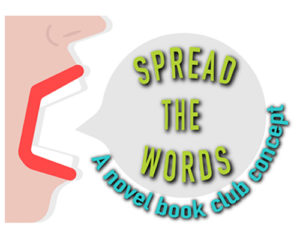 page. Mary’s book is the featured selection this month for Spread The Words, a FabOverFifty book club created with Early Bird Books. The story of a Southern family during the socially and politically tumultuous 1960s, and the secrets that bind its members together, Home In The Morning introduces us to Jackson Sassaport, a man who often finds himself in the middle. Whether torn between Stella, his beloved and opinionated Yankee wife, and Katherine Marie, the African American girl who first stole his teenage heart; or between standing up for his beliefs and acquiescing to the wishes of his prominent Jewish family to not stand out in the segregated South, Jackson learns to balance the secrets and deceptions of those around him. But one fateful night in 1960 forces the man in the middle to reconsider his obligations to propriety and family, and begins a chain of events that forever changes his life and the lives of those around him. Mary’s riveting novel traces the ways that race and prejudice, family and love intertwine to shape our lives.
page. Mary’s book is the featured selection this month for Spread The Words, a FabOverFifty book club created with Early Bird Books. The story of a Southern family during the socially and politically tumultuous 1960s, and the secrets that bind its members together, Home In The Morning introduces us to Jackson Sassaport, a man who often finds himself in the middle. Whether torn between Stella, his beloved and opinionated Yankee wife, and Katherine Marie, the African American girl who first stole his teenage heart; or between standing up for his beliefs and acquiescing to the wishes of his prominent Jewish family to not stand out in the segregated South, Jackson learns to balance the secrets and deceptions of those around him. But one fateful night in 1960 forces the man in the middle to reconsider his obligations to propriety and family, and begins a chain of events that forever changes his life and the lives of those around him. Mary’s riveting novel traces the ways that race and prejudice, family and love intertwine to shape our lives.
I had the fortune to interview Mary about her life before becoming a published author, her conversion to Judaism and her move to Charleston, SC from the South Shore of Boston.
Please tell us a little about your childhood.
“I grew up in Weymouth, MA, the middle child of seven. My mother was an Irish American , an old timey mother and housewife, a wonderful woman, smart enough to do anything she wanted professionally had she lived in a different era. My father was Polish American and an airline pilot. They were married almost 70 years and lived at home before they went together to a nursing home shortly before they passed on. We were a tight- knit family and had a lot of fun.”
And your education and first job?
“I had a very checkered college education, going to four different schools during the 60s. I couldn’t decide where or what I wanted to be. Eventually, I settled down and ended up in the Boston University evening program. I would have preferred staying home to write, but when I met my husband at 23, he insisted that I finish my education. Then I went on to study for a Master’s Degree in creative writing from BU.
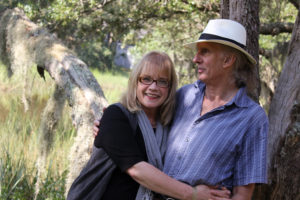
“I was a medical secretary in Boston for about three years, and then I was a freelance writer and worked in public relations. I even ghost wrote an academic book for a psychiatrist. I wrote scripts for slideshows, museum brochures, grant applications, a little bit of everything. I didn’t intend to do those things for the rest of my life, but I felt I needed to carry my weight at home while I worked on my novels.”
Tell us about your husband. Do you have children?
“I met my husband 47 years ago, when I was 23 and he was 28. We married six years later. He’s an attorney and earned a Master’s in international law at Harvard. He always had some business or other going on and has been loaning money to small real estate developers since his retirement from practicing law. We never had children. I had a number of miscarriages but didn’t want to make a fetish out of having children. I decided I could turn my energies elsewhere, and I did.”
For how long were you a freelance writer before starting to write novels?
The last freelance job I had was in the mid-eighties, but throughout I was writing poetry and working on creating fiction. My darling husband encouraged me to write. Without him, I would have freelanced a lot longer! One of my novel manuscripts was chosen as a finalist by the Massachusetts Arts and Humanities Foundation in the late seventies, but no one wanted to publish it I had a well-known agent at the time, who shepherded five more novels through the rejection process. I couldn’t get published for love or money. There was no such thing as respectable self publishing back then, so I just kept plugging away.”
When did your big break arrive?
“I switched agents after 30 years of being unpublished, because everyone told me I needed someone new. They were right. Within two weeks, my new agent, the fabulous Peter Riva, had multiple offers for Home in The Morning. It was actually the seventh novel I wrote, but the first one published, by Open Road Media. The others were all really good novels, except one which I’ll admit was a real stinker, but I think I was writing the wrong ideas at the wrong time. Since then, I’ve decided that the writing business involves a great deal of luck. You write something at the right time and it gets published.
“In retrospect, I think I was lucky to be published when I was mature. A lot of younger writers get swelled heads. They write themselves out and they don’t develop. I would have been a good candidate for getting a swelled head.”
What drew you to write historical fiction?
“I realized historical fiction was my metier after I wrote Home in the Morning. Freelance writing prepared me for my historical research because when you freelance, you often immerse yourself in a field you know nothing about and learn enough to talk about it intelligently. In writing historical fiction, I’ve learned that the public memory is very short. History isn’t taught like it used to be. I’m shocked, for example, when I talk to book clubs of southern women who don’t know civil rights history, even though many of them and their parents lived through it.
“Also, I’m attracted to what I call Frank Capra-esque characters, men and women who are devoted to ideals, who want to live simply and well. When they come up against a crisis that challenges those ideals, great drama is born. Sometimes they succeed, sometimes they fail but they always maintain a kind of nobility. Now, moderns have trouble with nobility. They’re cynical and self-absorbed. If you write about the kind of people I admire in an historical setting, it comes off much better than if you write about them in a contemporary one.
“Home in the Morning shares characters with my second and third books, One More River and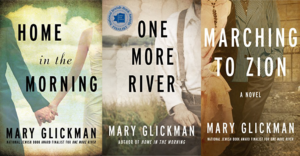 Marching to Zion. I think of them as a triptik, examining different eras in 20th century America, when being southern and Jewish were full of different conflicts.
Marching to Zion. I think of them as a triptik, examining different eras in 20th century America, when being southern and Jewish were full of different conflicts.
“I learned about the Great Mississippi Flood of 1927, the dramatic focus of One More River, when my husband read John M. Barry’s Rising Tide, a brilliant nonfiction analysis of the event which is considered the worst natural disaster in American history. Nearly 900,000 people were left homeless by the flood and huge populations of African American sharecroppers traveled north to work in factories, which changed the economy and the landscape of the South.
“The near nationwide race riots of 1917 are a backdrop for my third novel, Marching to Zion. An Undisturbed Peace examines the often forgotten events leading up to the Indian Expulsion Act and the Trail of Tears. I think that writing about such events makes the act of writing historical novels a public service. We’ve all forgotten so much!”
You grew up Catholic and converted to Judaism. Please tell us why. How did your parents react?
“My mother was a devout Catholic, and she implanted a need for a religious structure in my life. I couldn’t accept Catholicism and in my youth looked at many different religions. Always I came back to Judaism. I had an affinity for it. Judaism was the poetry of my soul. I converted a year before I married. It had nothing to do with my husband. He came from a Russian Orthodox Jewish family but had become secular long before he met me. My mother was upset when I told her I needed to have a Jewish wedding ceremony, but she came to accept the situation. She adored my husband.
“I lived very observantly for the first few years of my marriage, but after my best friend in Boston was murdered at 33 years old, I was traumatized, broken hearted. I felt betrayed by my God, and little by little I became less observant. But I was deeply connected to my Jewish community in Boston and I’m still plugged into the Jewish community in Charleston, where we now live.”
What made you move to the South and what do you like most about it?
“In the late 1980s we took a sabbatical to live in a fishing village in the south of Spain, and planned to stay at least a year. After six or seven months, the dollar tanked, so we decided to go to Charleston, SC, because we had fallen in love with it while on vacation years before, and wanted to try out living there.
“We lived in Charleston about a year, where I worked at a equestrian center, mucking stalls, and fulfilled a life-long desire to take riding lessons. Eventually, I bought my lesson horse, King of Harts, a stubborn loveable Appaloosa with a sense of humor. It’s magical to be so intimate with a 1,000 pound creature and such fun to go charging through the woods.
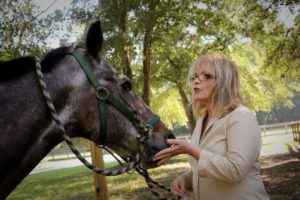
“We went back to Boston when we ran out of money, but we bought a little condo on Seabrook Island to have a toehold down here. I’d return about five times a year to see my horse and my friends. Later one, I moved my horse up north. My husband, horse, two cats and I came to Charleston permanently about 10 years ago. Hart passed away about five years ago at the age of 35. I miss him. The cats passed away too, one by one, but we have a new generation of cats, two brothers who are adorable but, I swear, savage little beasts.
“Life in Charleston is good. We have a gorgeous climate, beautiful flora and fauna. We enjoy the music scene here, especially bluegrass, Americana, and blues concerts. Overall, life is slower and more thoughtful, the people are delightful. You know, for a Southerner, the greatest social sin is to be rude. I like living with that kind of grace.”
What is a typical day like for you?
“I get up early to take care of my email or read the news online. Then I sit down and write for about three hours. There’s only just so much concentrated work you can do before the words stop making sense and you have to stop. I shoot for 1,000 words a day. In the afternoons, I do domestic chores and things with my husband, have lunch with the girls if I can, then I might write for another hour sometime between 4 p.m. and 8 p.m.
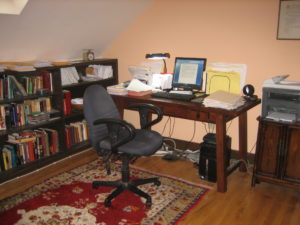
“I recently acquired a half interest in a lovely horse with excellent blood lines. A friend and I have taken him on as a project. We plan to train him, maybe show him in the spring. The woman who bred him is a friend of ours who is selling her farm and stock. We loved him and didn’t want him to have an uncertain fate. Our friend is a most generous woman. She gave him to us. So now we have a new horse to play with.”
How do you want your books to affect readers?
“I think of myself as a storyteller concerned with the human condition. The history in my books is a setting, the social problems I investigate in them are also partly setting. It’s the characters that matter. I want my readers to be entertained and engaged, to care about my characters, and to be moved. I’m not a preachy writer although I’d love my readers to learn something new. I always love learning when I read. I learn a lot when I write, too.”
Do you have a final thought?
“Sure. I have a message for struggling writers, young and old. I plugged away for 30 years, which takes a lot of the ego out of you. That’s not a bad thing. Rejection isn’t the end of the world. As long as you’re working on something new and are intellectually engaged, you’ve got hope. That’s important!”
